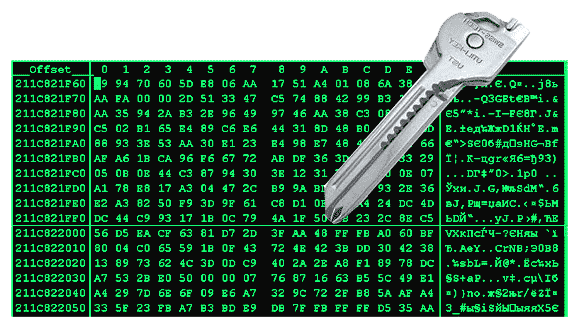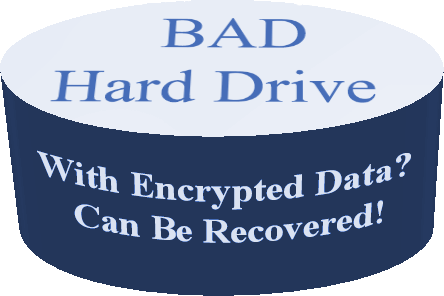Hard Drive Encryption
Unaware user can be confused by all those well-known and brand new encryption tools on the market. Perhaps, the decision of choosing some encrypted software product installed on your computer is made based on expectations to have the most sophisticated tool to protect your data from unauthorized access. At that point the least of your concern is what’s going to happen to your protected, by complex encryption tool data one day when the storage of your data, a.k.a hard drive failed.
Data Recovery from Encrypted Hard Drive
Encrypted LBA sectors

This is how it looks like when the hard drive has the encrypted LBA sectors.
We will try to answer to the most frequently asked questions from our experience with the customers who once had a misfortune of losing their encrypted data, and bring a light to which encryption products are friendly for data recovery process. First of, not every encryption tool on the market is data recovery friendly, but who cares beforehand? However you may re-consider your choice of encryption tool after sudden lost control for access to own protected files.
Second of, by all means stay away from the products that encrypt the whole hard drive (encryption of each and every sector). And mainly, you absolutely need to pay attention the fact of what actually encrypts one or another encryption tool. The bottom line, there is always a better chance to recover data for encrypted particular files, folders, or even virtual partitions, than the whole encrypted drive. We recommend avoiding any full disk encryption tools. The full disk encryption means that everything on the drive is encrypted including the bootable operating system along with an encryption tool itself. The not so good news for data recovery lab in this case – we have to recover every single sector on the drive. And it is not a problem for drives with clean surface, but if the internal disk platters are scratched, the reading of entire volume may be deadly in terms of data safety.
A regular drive with any operating system has all sectors, or mostly all sectors not encrypted. In that case, there is no need to scan every LBA sector on the failed drive to recover requested files. Technically, for the data recovery purposes it is enough to scan only the necessary file table plus chains of sectors belonging to particular files and folders. It helps a lot in salvaging the most critical files for user. Let say if you have only 20 Gigabyte of data in files located on 2 Tb drive, then only 1% of all sectors is required to be read from the regular, not-encrypted drive. And 100 times more to read for totally encrypted drive! Such time extent in scan process from failed drive might be crucial for data integrity in general and platter readability in particular. We'll skip on other pitfalls for such encrypted method.
If you still inclined to use a full disk encryption, you probably may be more interested in using hardware-based encryption products, such as WD external drives, rather than sophisticated encryption software products. Some of that software so sophisticated that even developers could not figure out how to help us to decipher their own algorithm.
In today's business data encryption has become a common method to protect valuable company data and enhance privacy. While encryption adds an element of complexity to the data recovery process, encrypted data can indeed be recovered by experienced data recovery specialists at LaptopData.
LaptopData has the capability to recover data while leaving the data in its encrypted form throughout the entire process. Many organizations are comfortable providing encryption keys so that data can be decrypted and verified before it is returned, however this is not always the case. For some organizations, providing encryption keys to an outside vendor such as a data recovery provider is against their security policy. In these cases, the data will be recovered and sent back to the client in its encrypted form on a new hard drive; however, the specific file condition will be unknown until the files are decrypted by someone with access to the encryption key.
Lost Passwords and/or Encryption Keys
The most important aspect of encryption deployment is management of keys (passwords, files, tokens, certificates, etc). Each technology and product handles this differently, but a lost/incorrect key could lead to the inability for authorized people to decrypt information. In cases where the keys have been lost or a password has been forgotten, we typically do not attempt these types of recoveries and refer the customer back to the software provider.
Additional information about encrypted drives:
Fast Start to Unlock Your Drive
Contact us with submitting a standard online form or make a call. We start recovery immediately after you approve the requested service.

